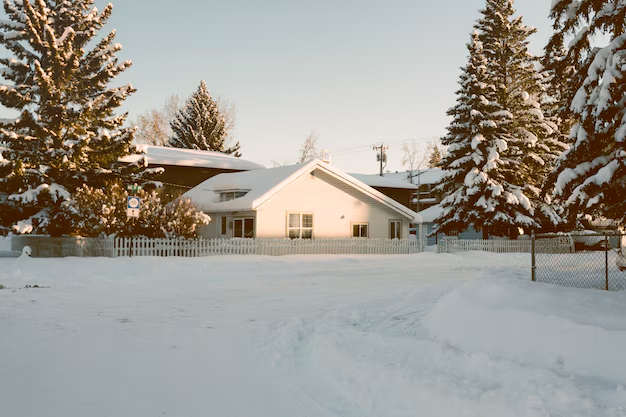Is It Safe to Leave Your Refrigerator Outside in the Winter?
As winter approaches and temperatures drop, many homeowners find themselves questioning the logistics of storing large appliances, particularly those already relegated to the garage or porch. One common question is whether you can leave a refrigerator exposed to the harsh winter conditions. This article will delve into the practicalities, potential risks, and considerations for leaving a refrigerator outside when winter hits. Let’s explore the various aspects to help you make an informed decision.
Understanding How Refrigerators Work
Before tackling the question of outdoor storage, it's helpful to understand the basic mechanics of how a refrigerator operates. Refrigerators function by moving heat from the inside of the unit to the outside, utilizing a refrigerant that circulates through the system. This process is designed to work efficiently within typical room temperatures. Consequently, extremely low or high temperatures can interfere with a refrigerator's ability to maintain its internal environment.
The Refrigeration Cycle
- Evaporation: Refrigerant absorbs heat from the items inside the fridge, turning from a liquid to a gas.
- Compression: The gaseous refrigerant is compressed, increasing its temperature, and pushed through coils outside the fridge.
- Condensation: As it cools, the refrigerant turns back into a liquid, releasing absorbed heat outside.
- Expansion: The process begins again as the refrigerant moves through an expansion valve, ready to absorb more heat.
This cycle is regulated by the refrigerator’s thermostat, which is adjusted based on ambient room temperatures.
Potential Issues with Cold Weather
Thermostat Challenges
One significant issue with leaving a refrigerator outside in winter is that most thermostats are not designed to handle freezing temperatures. Many refrigerator thermostats sense the ambient temperature to regulate cooling cycles. If the outside temperature drops drastically, it can mislead the thermostat into thinking the refrigerator interior does not need to cool, possibly resulting in items spoiling.
Compressor and Motor Performance
Refrigerator compressors and motors are typically built for climates between 59°F and 95°F. In cold conditions, the oil that lubricates the compressor might thicken, causing friction or outright failure. It could also lead to the compressor not operating efficiently or even shutting down.
Electrical Concerns
Moisture, snow, and ice pose serious risks to electrical components. Exposure to these elements can lead to corrosion of connectors and circuits, raising the potential for electrical failures or hazards, which might be especially concerning in older units not designed for outdoor use.
Environmental Considerations
Outdoor Exposure
Leaving a refrigerator exposed to the elements can cause rust and wear over time. Moreover, seals may degrade faster in a cold, damp environment, leading to inefficiencies. It's also crucial to secure the appliance to prevent it from tipping or being damaged by high winds.
Legal and Aesthetic Issues
It's worth noting that leaving an appliance outside might violate local codes or homeowner association guidelines due to aesthetic concerns. Always verify any legal restrictions in your area before proceeding.
Protective Measures If You Must
If storing a refrigerator outside is your only option, consider these protective measures to minimize potential damage:
- Shelter: Place the refrigerator under a covered area, such as a porch or awning, to protect it from direct snow and rain.
- Insulation: Use insulated covers specifically designed for appliances, ensuring airflow isn’t obstructed.
- Regular Checks: Periodically inspect for ice buildup, rust, and ensure it's operational.
- Elevate: Raise the fridge slightly off the ground using bricks or a platform to guard against snow drifts or pooling water.
Alternative Solutions
Indoor Storage Options
If possible, consider moving the refrigerator to the basement or garage. This helps maintain a more stable temperature and reduces the appliance's exposure to harsh elements.
Utilize a Garage Kit
Some refrigerators can be fitted with a garage kit. This seems to enhance the thermostat’s ability to operate at lower ambient temperatures. If you’re considering storing a fridge in a semi-outdoor setup like a garage, investing in such a kit might be beneficial.
Key Takeaways and Practical Tips
To summarize the critical points for deciding whether to store a refrigerator outside in winter, consider these factors:
- Test Thermostat Capabilities: Verify if the refrigerator can handle low temperatures by consulting the manufacturer’s specifications.
- Assess Environmental Conditions: Factor in exposure to moisture and wind, potential legal restrictions, and aesthetic implications.
- Ensure Protection: Use insulated covers and ensure shelter to minimize exposure to snow and moisture.
Quick Reference Guide:
🌨️ Extreme Cold Impacts: Refrigerators struggle as thermostats react poorly in freezing conditions.
⚠️ Mechanical Risks: Compressors may fail due to thickened lubricant at low temperatures.
🔌 Electrical Dangers: Moisture increases risk of corrosion and potential electrical hazards.
📦 Preventive Steps:
- Shelter under cover.
- Insulate using appliance covers.
- Check and maintain regularly.
- Elevate to prevent water damage.
Making the Decision
Leaving a refrigerator outside can seem convenient but brings numerous challenges. While some modern units may be more tolerant of colder temperatures, most are not optimized for this setting. Assess all aspects, from appliance durability to local regulations, before proceeding.
Understanding that winter weather presents unique challenges will help guide you in making the smartest decision for your refrigerator storage needs. Always aim for solutions that promise longevity and safety for your appliance investments, while considering environmental impact and compliance with local guidelines.
By carefully evaluating your situation and weighing the pros and cons, you can decide whether outdoor storage in the winter is feasible for you or if alternative options might better suit your needs.

